
Definition of GoodsSale of Goods Act 1930 Types of GoodsExisting Goods,Future Good,Contingent
Magistrates Court (Enforcement of Judgments) Act 1994: pt 7 div 5: 10 April 1995: A1990-20: Registration of Interests in Goods (Consequential Amendments) Act 1990: s 4: 30 June 1990: A1977-65: Acts Revision Act 1977: sch 2: 22 December 1977: A1975-39: Sale of Goods Act 1975: ss 2-5: 31 October 1975: A1967-25: Sale of Goods Act 1967: s 3: 1.
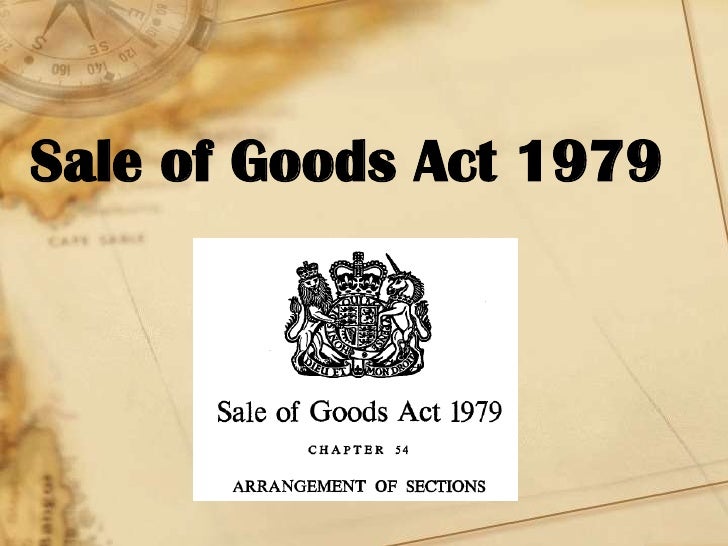
Sale Of Goods Act 1979
1. Short title, extent and commencement. (1) This Act may be called the Sale of Goods Act, 1930. (2) It extends to the whole of India. (The words "except the State of Jammu and Kashmir" omitted by Act 34 of 2019, s. 95 and the Fifth Schedule (w.e.f. 31-10-2019).) (3) It shall come into force on the 1st day of July, 1930.

Sale of Goods Act 1930 Breach Of Contract Auction
The Sale of Goods Act is pre-independence legislation and is mostly inconsistent with today's trade regimes. If India upgrades the laws as per the United Nations Convention on Contracts for the International Sale of Goods 1980, it will be easier and better to deal with private international laws as well as if there is a conflict of laws, then.

Sale of Goods Act 1930 YouTube
There are five rules in the Act which explain who has title when: Rule 1. Where there is an unconditional contract for the sale of specific goods in a deliverable state, the property in the goods passes to the buyer when the contract is made, and it is immaterial whether the time of payment or the time of delivery or both is postponed. Rule 2.

LECTURE1/INTRODUCTION/SALES OF GOODS ACT 1930/LEGAL ASPECTS OF BUSINESS/UNIT9//UPDATED
Sale of Goods Act replaced by Consumer Rights Act. The Sale of Goods Act has been replaced by the Consumer Rights Act. The Consumer Rights Act came into force on 1 October 2015. The Consumer Rights Act has made some changes to your rights to return faulty goods and get a refund, replacement or repair, and gives you new rights when you buy digital content.
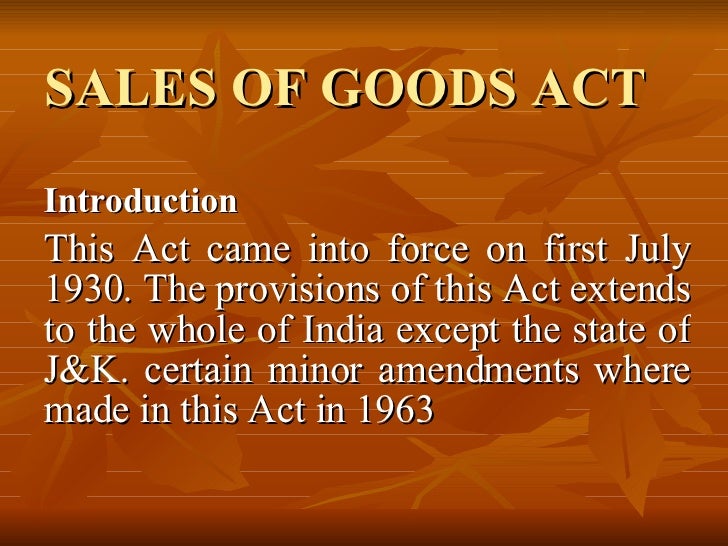
Sales Of Goods Act[1]
3 SALE OF GOODS c. S-1 CHAPTER S-1 An Act respecting the Sale of Goods SHORT TITLE Short title 1 This Act may be cited as The Sale of Goods Act. INTERPRETATION Interpretation 2(1) In this Act: (a) "action" includes counterclaim and set-off; (b) "buyer" means a person who buys or agrees to buy goods; (c) "contract of sale" includes.
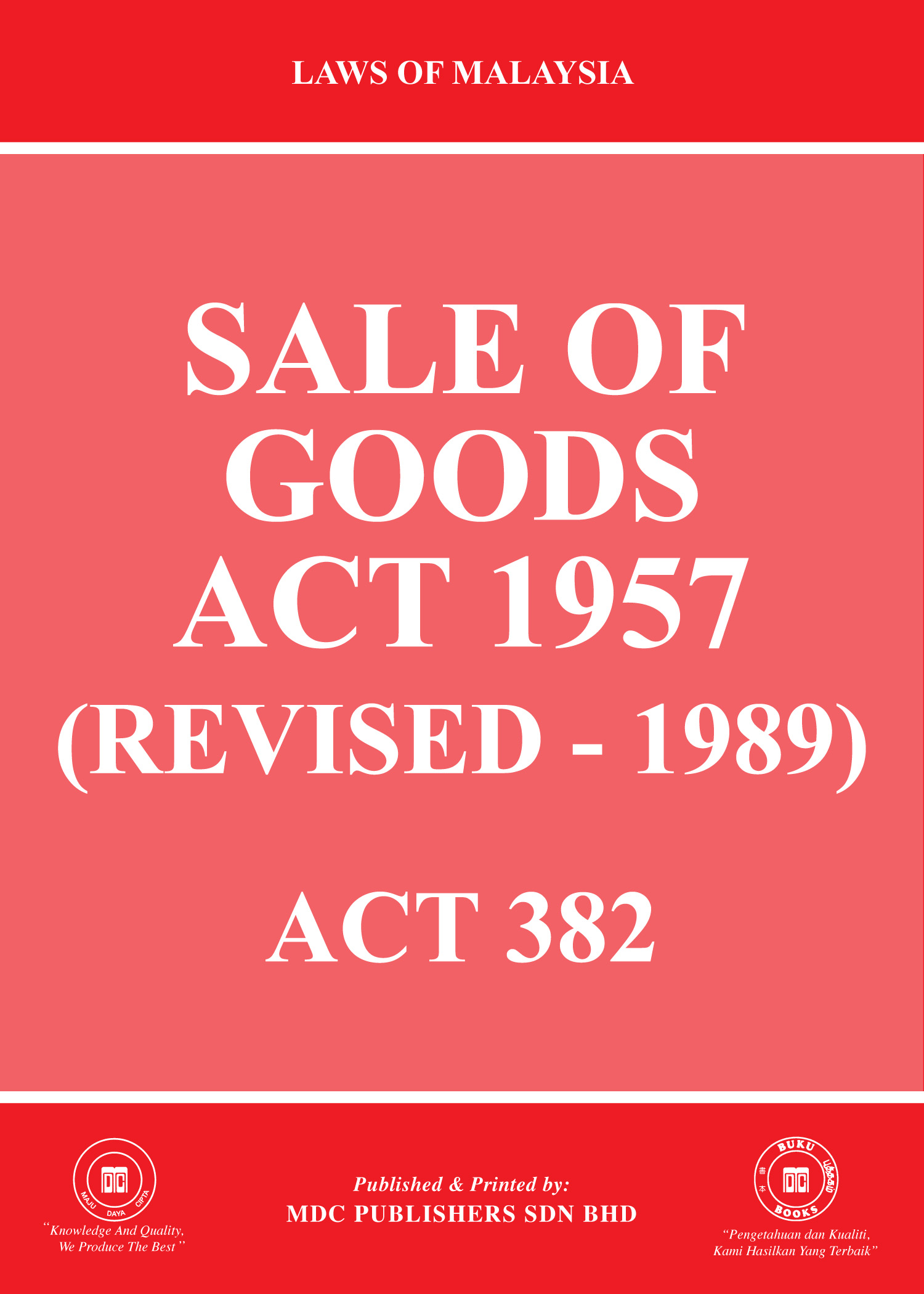
Laws of Malaysia Sale Of Goods Act 1957 (Revised 1989)
Introduction. This summary examines the Sale of Goods Act 1979 ("the Act") within its context: why it was drafted, what are its important provisions, and how it has changed since it came into force. It is submitted that the Sale of Goods Act 1979 has been part of a change in consumer dealings, with its most significant contributions being.

Sale of Goods Act 1930 Lecture notes 1 Sale of Goods Act, 1930 CONTRACT OF SALE OF GOODS
The Sale of Goods Act 1979 (c. 54) is an Act of the Parliament of the United Kingdom which regulated English contract law and UK commercial law in respect of goods that are sold and bought. The Act consolidated the original Sale of Goods Act 1893 and subsequent legislation, which in turn had codified and consolidated the law. Since 1979, there have been numerous minor statutory amendments and.

The sale of goods Act NSW TOPIC 1 TRANSFER OF PERSONAL PROPERTY The Sales of Goods Act 1923
Part I U.K. Contracts to Which Act Applies 1 Contracts to which Act applies. U.K. (1) This Act applies to contracts of sale of goods made on or after (but not to those made before) 1 January 1894. (2) In relation to contracts made on certain dates, this Act applies subject to the modification of certain of its sections as mentioned in Schedule 1 below. (3) Any such modification is indicated in.
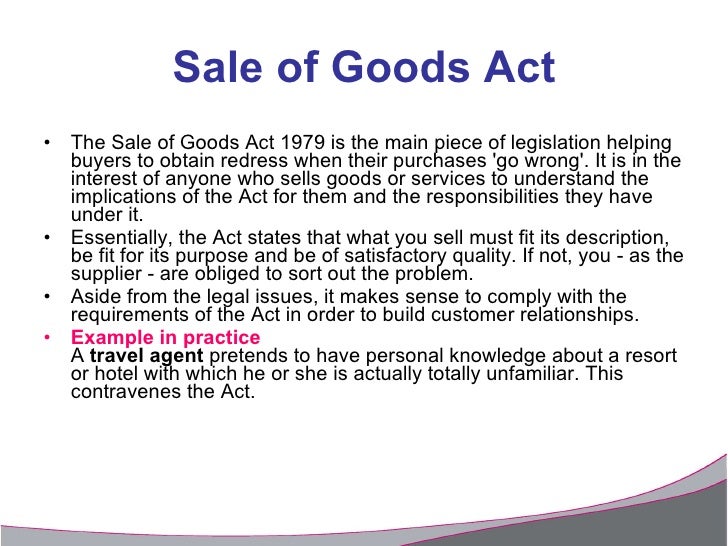
Sales l l_ppt
The Sale of Goods Act 1979 (SoGA) state that the goods you sell are as described, fit for purpose and of satisfactory quality. Following the enactment of the Consumer Rights Act 2015, most of the provisions of the SoGA ceased to apply to trade, especially in regard to consumers. Only consumer goods that were purchased before the 30th of.
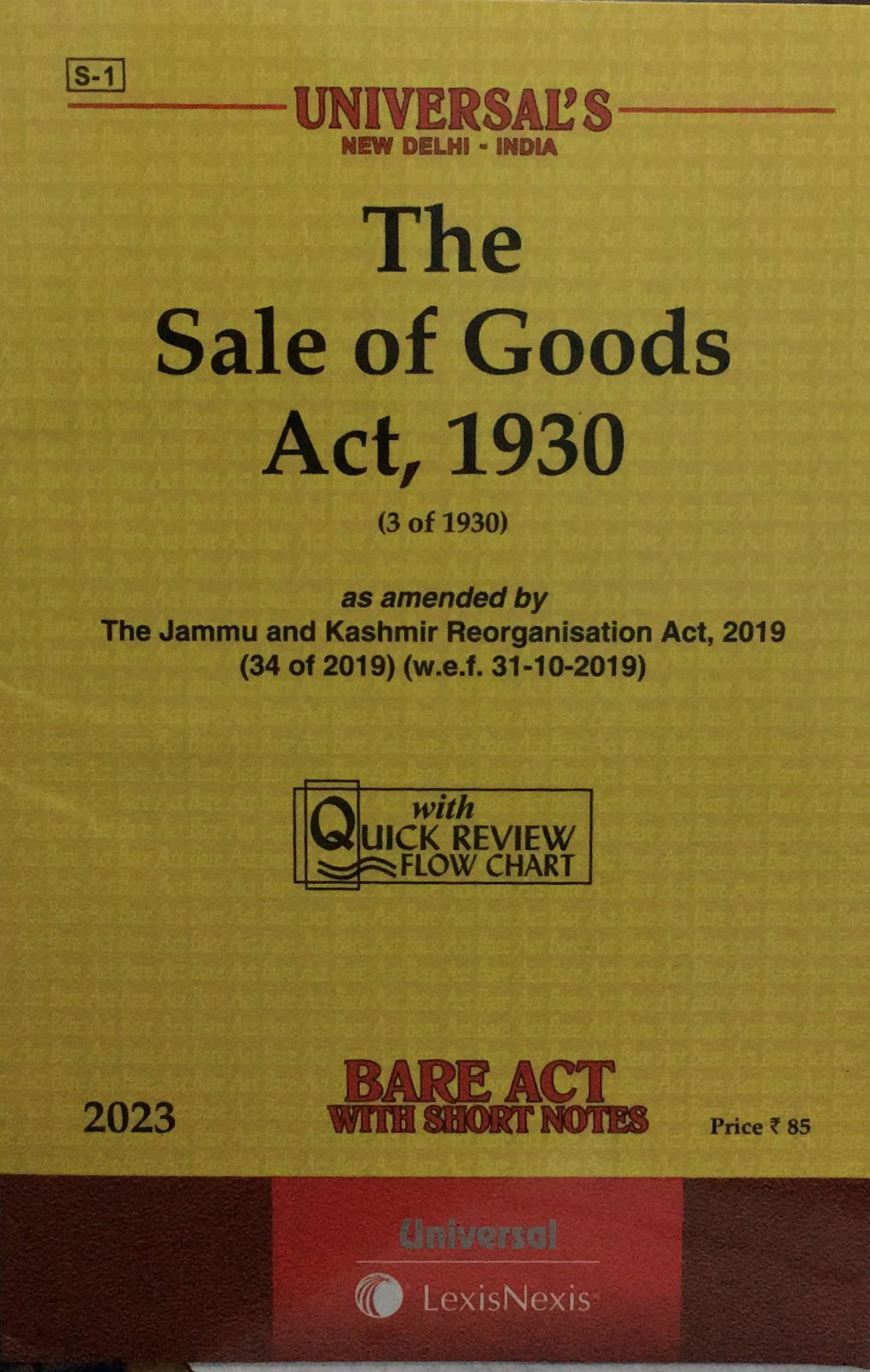
The Sale of Goods Act, 1930 Bare Act With Short Notes 2023 Universal Lexis Nexis Buy Online
4 THE SALE OF GOODS ACT, 1930 ACT NO. 3 OF 19301 [15th March, 1930.] An Act to define and amend the law relating to the sale of goods. WHEREAS it is expedient to define and amend the law relating to the sale of goods; It is hereby enacted as follows:— CHAPTER I PRELIMINARY 1. Short title, extent and commencement.—(1) This Act may be called the 2*** Sale of Goods Act,
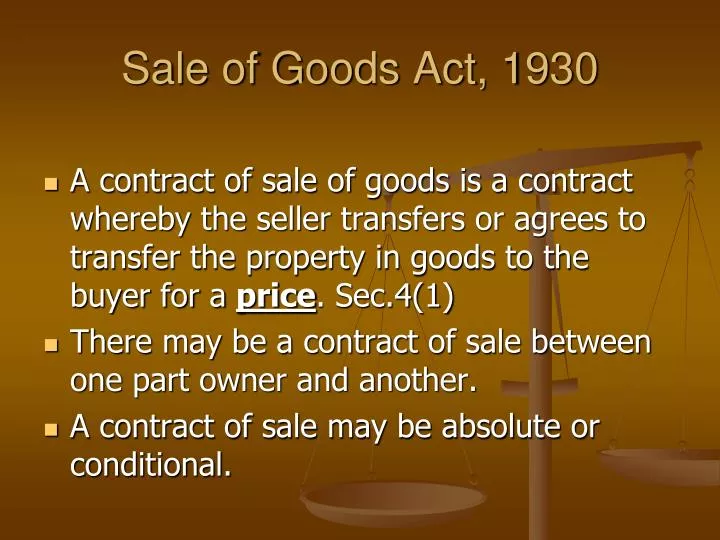
PPT Sale of Goods Act, 1930 PowerPoint Presentation, free download ID7082600
Sale of Goods Act. R.S.O. 1990, CHAPTER S.1. Consolidation Period: From December 9, 1994 to the e-Laws currency date. Last amendment: 1994, c. 27, s. 54. Definitions and interpretation. 1 (1) In this Act, "buyer" means the person who buys or agrees to buy goods; ("acheteur")
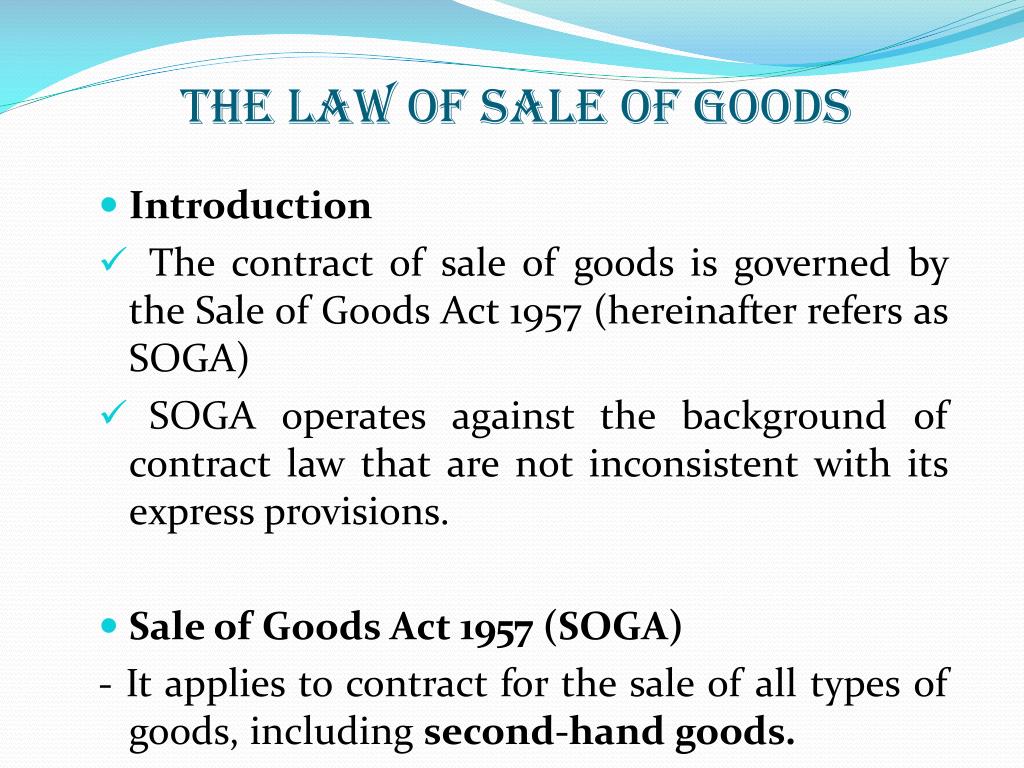
Sale of Goods Act 1957 NicolashasAbbott
The Indian Sale of Goods Act 1930 is a mercantile Law, which came into existence on 1 July 1930, during the British Raj. It provides for the setting up of contracts where the seller transfers or agrees to transfer the title (ownership) in the goods to the buyer for consideration.

Agribility The Sale of Goods Act
Section 60, Sale of Goods Act 1979; Section 61, Sale of Goods Act 1979; Section 62, Sale of Goods Act 1979; Maintained. Resource Type . Primary Source.
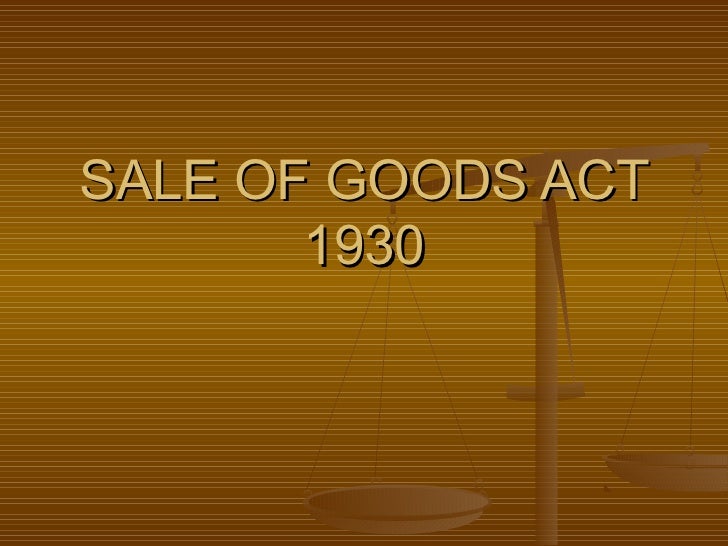
Sales of good_act
The Act brings together previous legislation, including the Sale of Goods Act 1893. Many minor statutory amendments and additions have been made since 1979. The Act excludes goods bought on hire purchase, which are covered by The Supply of Goods (Implied Terms) Act 1973. Note that the Consumer Rights Act (CRA) 2015 replaced the Sale of Goods.
+for+money..jpg)
Sale of goods act s 52 bopqedear
The Sale of Goods Act 1893 ( 56 & 57 Vict. c. 71) was an Act of the Parliament of the United Kingdom of Great Britain and Ireland to regulate contracts in which goods are sold and bought and to define the rights and duties of the parties (where not expressly defined in the agreement), while specifically preserving the relevance of ordinary.
- Phantom Of The Opera Melbourne 1990
- Where Is Majestic Princess Now
- Is The Palmerston Highway Open
- What Cancer Did Sam Docherty Have
- Words To Alouette In English
- Bird Toy That Drinks Water
- Moon Boot For Ankle Fracture
- Calls From 852 Area Code
- West End Bottle Shop Washington Pa
- Penrith Panthers Indigenous Jersey 2023